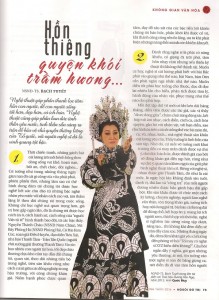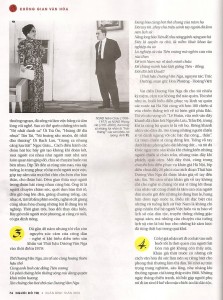Performing arts help to purify one’s mind so that one would live a better and useful life. It also tempers patriotism and willingness to protect the sacred sovereignty of the country. For an artist, it is the utmost honour. 1. During wartime, cai luong troupes drifted with the ups and downs of life. We experienced joy and sorrow, misfortune, insecurity, and were ravaged by deaths and hunger… In those difficult days, everything should have been okay and cursory, but in contrast, the youngsters like us learned acting thoroughly from the patriotic artists, who had great personalities quietly watching us. Not only learning about acting, but the most important and valuable lessons we learned were courtesy behaviors and interactions with others as “a decent Vietnamese”, that were established through many generations. We learned the behaviours from cai luong pioneers, such as Nguyen Thanh Chau (People’s Artist Nam Chau), Phung Ha (People’s Artist Phung Ha), Hai Kim Cuc, playwright Dieu Huyen, director Tieu Xai, and journalist Thanh Tam – Tran Tan Quoc (founder of Thanh Tam awards). There were many more talented people, who guided and watched us make progress on the stage as well as our conducts among colleagues in the back stage and with audiences. The happiness, for being taught and getting attention from the veterans, made us excited when we received courage and achievement, and worried when we were imperfect in our performance.
2. Although artists have to have talents and born with a gifted voice and sensitive heart, but if we lack techniques, we would not succeed. To sing well, cai luong artists need to know how to trill different modes, such as Bac, Nam, and Oan. To act well, we have to memorize the play well, read the script over and over again to understand and be able to analyze the character’s mind and actions, as well as dress appropriately for the character. 
Sometimes it took months to rehearse a new play. Artists got the scriptwriter and teachers “sizing for well-fitting shoes”, and practiced every single movement of the character. We, with music, practiced acting and singing, related to the character and coordinated with co-actors so that everything would be blended nicely in a summing form of poetry, singing, dancing, music and drama … which cai luong stage required. Playwright was the soul of the rehearsal. Therefore, the opening of each play always got a great attention, excitement, and was highly received with a huge number of audience, as well as praises from well-known art critics. For artists, receiving a Thanh Tam award was a remarkable achievement, a big festival confirming their fame. Their salaries and contracts were, of course, well considered by troupe owners. When all processes of a play were professionally prepared, when actors and actresses were creative and respectful to the audience, and rehearsed carefully, when the play had good context, presented with moral values, was suitable with the society, and incorporated melodies effectively, then the performance night would be well received. In those days, cai luong lovers would come to the ticket box each night and ask “Does artist XYZ perform tonight?” The short but meaningful question showed love, admiration, and faith in the artist, whose voice and performance has convinced the audience. The artist has lived and worked devotedly for the stage. How one could ever forget names, such as “Number one singer” Ut Tra On, “King of disc records” Tan Tai, “Moping Queen, Number one female lead” Ut Bach Lan, “Silky voice” Ngoc Giau … Management of the troupes at that time created a united atmosphere. Everyone was treated as within the same family. We cared for each other and shared happiness as well as sadness. When Lunar New Year came, everyone was excited to rehearse the play, prepare the costumes, and at the same time give each other a hand decorating the troupe and renewing themselves. On the New Year eve, everyone in the troupe bestowed their gratitude to the ancestors. Keeper of the troupe, the person taking care of the altar, lit up the light, stroke the bell and played on drum. Musicians adjusted their instruments, actors and actresses sang to the ancestors. Time goes by with lots of changes and whirligig. Everyone is now apart with their own family and advanced in years.
3. It has been almost 40 years, but I still have the same feeling of a citizen and of an artist when performing on the stage the Empress Duong Van Nga in 1979:
I! Duong Van Nga, kowtow Heaven and Earth
And the spirits of ancient Kings
Are the spirits of rivers and mountains adhered to scented smoke?
Please witness the breaths of Duong Van Nga
In synced with the breaths of all people
A pair of my hands signifies millions of hands making a history
Lifting the Emperor’s robe as bearing the country’s responsibility.
This is the sacred sovereignty, the longing to settle down
Is the Emperor’s mission to fight against foreign invasion
For the South shining with orient pearls
To witness heroes and heroines of the Fairy and Dragon Forever indomitable!
(Empress Duong Van Nga, Author: Truc Duong, Playwrights: Hoa Phuong -Hoang Viet) 
The role of Duong Van Nga brought me lots of unforgettable memories and emotions. I clearly remember the show for international ambassadors at Ha Noi and over 100 soldiers, who just came back from the Northern borders. I sang: “Le Hoan, you’ve just greeted Nguyen Luu, Tran De, while I and other court officials ignored them. Only you were friendly to commoners, and treated unknown soldiers as high ranked officials.” All hundreds of soldiers stood up. The applause in the theater kept going nonstop … and I cried right on the stage witnessing bared foot soldiers with full of braveness. Just a short while ago, in another show in Ha Noi, the nearly 20-minute plot of Duong Van Nga play was applauded six times. I felt the audience clapped their hands not only for us, the artists, but for the character’s dialogue, which were also deep thoughts that each citizen wanted to send to those threatening our country. A very special thing in the Vietnamese history-theme performance is that it not only helps Vietnamese in many generations understand and be proud of our history, our tradition of fighting against intrusion, but its stories also conveys lessons to foreign invaders who had failed in the past.
4. A journalist said that attending cai luong theater each night, a habit of Saigon’s people, now no longer exists. In the past, the audience had certain cultural backgrounds making a unique attitude of viewers. I miss the appreciation, respect, and enjoyment of the audience while following the play in the 1960’s. In the war time, I saw a begging woman in Hue dressing in a traditional long dress with many pieces of fabric. It revealed the self-esteem of the entire nation “poor with dignity, tattered with honor.”
There is a saying “like theater like audience.” If the theater is professional, then its audience is also neat. An unorganized performance can’t ask the audience not to be careless. I always wish to see elegant theaters for traditional singing and performing, such as cheo, tuong, and cai luong. I wish to see theaters that are well equipped to provide basic foundation and good condition so that traditional performing arts can develop and uphold with other forms of arts and entertainments. Nowadays, we have many convention centers, but totally lack of professional theaters for traditional arts and culture, where we can perform and train academically and practically from roots to top. I remember a sentence of Empress Duong Van Nga when convincing Le Hoan to accept the throne: “You are the soul of the soldiers, the best person to carry out ancient Emperors’ mission. If you officially took over the throne, I and my son would be happy to live a quiet life as a normal citizen. I will teach my son that this country belongs to everyone! A noble person can’t view a common matter with his personal eyes.” Anyone from a regular person, royal officials, or lords should learn these fundamental dialogues. Regardless how smart we are, we should never forget to live with courtesy and respect to ordinary people around us.
5. Artist Nam Chau used to teach us that “Seeing to realize, listening to remember, and practicing to learn. Working in the art field, one first has to learn to view the world as well as oneself honestly, and listen sincerely, then one would have a good foundation to perform real.” When being taught about our country under invaders’ rules, and seeing people being attacked and harassed … we asked ourselves what we could do to help the country and life, to change our destiny, and be useful for ourselves, to others and society through traditional arts like cai luong.
When everything starts right and truthfully, then the Truth and Beauty eventually will come.
People’s Artist Bach Tuyet – Nguoi Do Thi Newspaper (Binh Than New Year 2016)
